Search the Special Collections and Archives Portal
Search Results

Transcript of interview with Gary Sternberg by Barbara Tabach, February - April, 2015
Date
Archival Collection
Description
In this oral history, Gary explains how the family came to live in the United States?Cleveland and Los Angeles. In 1957, he married Noreen and they eventually came to live in Las Vegas where Gary worked for Sears selling washing machines, had a repair business and an importing business with Noreen. Gary was an entrepreneurial soul and inventive much like his father. He owns three patents.
On August 25, 1931, Augusta and Herman Sternberg welcomed their second child, Gerd (aka Gary), into the world of Cuxhaven, Germany. Augusta was a devout Christian of Polish ancestry who had fled Russian persecution. Herman was a German-born Jew salesman and inventor. The couple fell in love and had two children, Gary and Ruth who was a year and half older. By 1938, German politics were targeting Jews and Herman was ripped away from his Christian wife and children and sent to a concentration camp. Fate and friendship rescued Herman with the option to go to China. And so begins the history of the Sternberg family and how they all would eventually live together during World War II in the confines of a Jewish ghetto in Hongkew, China from May 1939 to July 1948. Gary had an extraordinary career as a dealer. He was not the stereotypical young dealer-to-be: he was in his 40s when he signed up for the Michael Gaughn Dealing School in the mid-1970s. Gary?s charming wit and ease of making friends soon gained him a position at El Cortez and then Caesars Palace. It was the same personality that would sustain his stellar thirty-one year career at Caesars. He was employed there from April 1974 until his retirement May 8, 2005. Though Jewish tradition would identify Gary as Christian, he self-identified as Jewish, officially converted and has been an active member of the Jewish community. Among his anecdotes-and he has many-is one about securing a $30,000 donation from Frank Sinatra and Jilly Rizzo for Congregation Ner Tamid.
Text

Transcript of interview with Myrtle Hancock by Russell Oakes. February 26, 1980
Date
Archival Collection
Description
On February 26, 1980, collector Russell Oakes interviewed beautician, Myrtle Hancock (born January 1st, 1921 in Craig, Colorado) in her residence in Las Vegas, Nevada. This interview covers the narrator’s occupational experience as a wardrobe dresser in the entertainment industry in Las Vegas. She also discusses family life, life on a ranch, Downtown Las Vegas, Helldorado, and Nevada’s hot weather. The interview concludes with a discussion on the development of Las Vegas and the projected future growth.
Text

Transcript of interview with Vincent "Vince" Hart by Andrew Bannister, February 21, 1980
Date
Archival Collection
Description
On February 21, 1980, Andrew Bannister interviewed Vincent “Vince” Hart (born on July 7, 1945 in Jerusalem, Palestine) in Hart’s office about his experience with youth soccer, both as a coach and as a player. Hart discusses his family background and his residential history in the United Kingdom and the United States before explaining the development of the men’s soccer team at the University of Nevada, Las Vegas. He describes his impact on the program and his hopes for future student athletes. The two then delve into a discussion of the fundamentals of soccer and different strategies that are commonly used. They then conclude with a brief description of Vince’s experiences with meeting a variety of professional soccer players at the Las Vegas Stadium.
Text
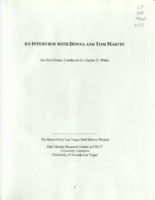
Transcript of interview with Tom and Donna Martin by Claytee White, January 31, 2013
Date
Archival Collection
Description
Hailing from Indiana and California, Donna Guiffre Martin and Tom Martin came to Las Vegas in the early 1950s as their parents sought new opportunities. Donna's father, Gus Guiffre, quickly established himself as a local television personality, while Tom's father took on a variety of entrepreneurial opportunities. Like many of the young people in Las Vegas, Donna and Tom enjoyed riding around town; horse-back riding; football games; Helldorado - and, of course, Rancho High School. This interview covers both Donna and Tom's early years before their moves to Las Vegas, as well as their memories of first homes, childhood experiences, early adulthood and their current lives.
Text
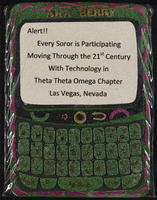
Alpha Kappa Alpha Sorority, Theta Theta Omega Chapter scrapbook: "Moving through the 21st century"
Date
Archival Collection
Description
From the Alpha Kappa Alpha Sorority, Incorporated, Theta Theta Omega Chapter Records (MS-01014).
Mixed Content
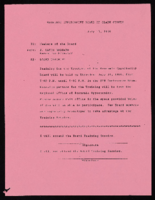
Economic Opportunity Board of Clark County (Nev.): memos, agendas, and meeting minutes
Date
Archival Collection
Description
From the Clark County Economic Opportunity Board Records -- Series I. Administrative. This folder contains memos, agendas and minutes from meetings of the Clark County Economic Opportunity Board from July 1969 through December 1969
Text

Michael Arage oral history interview: transcript
Date
Archival Collection
Description
Oral history interview with Michael Arage conducted by Dalton DuPré on November 12, 2021 for Reflections: The Las Vegas Asian American and Pacific Islander Oral History Project. In this interview, Michael Arage discusses his upbringing in the Greater Toronto Area (GTA), Ontario, Canada with his sister and his Filipino-Palestinian heritage. He talks about how his parents immigrated to the United States, his life and education in Toronto, and his relocation to Los Angeles, California where he married his wife. Michael Arage shares how the couple moved to Las Vegas, Nevada in 2012 when his wife started a job at Zappos. Because he lacked a work visa, Michael Arage began playing poker and working in sports betting. In 2019, he founded a community organization to support the people of Palestine, called Nevadans for Palestinian Human Rights. Michael Arage talks about his activism efforts, anti-Arab racism, his cultural upbringing, and of Filipino and Arabic foods and customs. He also shares his views of living in Las Vegas, the difficulties of raising a child away from her cousins, and differing governmental policies and healthcare between Canada and the United States.
Text

Zoe Albright oral history interview: transcript
Date
Archival Collection
Description
Oral history interview with Zoe Albright conducted by Barbara Tabach on October 16, 2018 for the Remembering 1 October Oral History Project. In this interview, Albright describes her work as a volunteer for the Red Cross and helping comfort those who came into the Metro Police Station after the 1 October shooting, searching for family and friends who were present at the Route 91 Harvest Festival. In addition to being a Red Cross volunteer, Albright is also a personal trainer, nutrition consultant and resident of Las Vegas since 1988.
Text
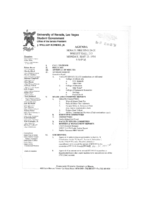
Meeting minutes for Consolidated Student Senate University of Nevada, Las Vegas, May 23, 1994
Date
Archival Collection
Description
Text
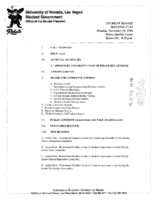
Meeting minutes for Consolidated Student Senate University of Nevada, Las Vegas, November 18, 1996
Date
Archival Collection
Description
Text
